@NonNull
private Account[] getAccountsAsUserForPackage(
String type,
int userId,
String callingPackage,
int packageUid,
String opPackageName,
boolean includeUserManagedNotVisible) {
---- // 省略若干方法
long identityToken = clearCallingIdentity();
try {
UserAccounts accounts = getUserAccounts(userId);
return getAccountsInternal(
accounts,
callingUid,
opPackageName,
visibleAccountTypes,
includeUserManagedNotVisible);
} finally {
restoreCallingIdentity(identityToken);
}
}
在 getAccountsAsUserForPackage 方法里面,经过一系列的判断,最终又会调用到 getAccountsInternal 方法。
@NonNull
private Account[] getAccountsInternal(
UserAccounts userAccounts,
int callingUid,
String callingPackage,
List visibleAccountTypes,
boolean includeUserManagedNotVisible) {
ArrayList visibleAccounts = new ArrayList<>();
for (String visibleType : visibleAccountTypes) {
Account[] accountsForType = getAccountsFromCache(
userAccounts, visibleType, callingUid, callingPackage,
includeUserManagedNotVisible);
if (accountsForType != null) {
visibleAccounts.addAll(Arrays.asList(accountsForType));
}
}
Account[] result = new Account[visibleAccounts.size()];
for (int i = 0; i < visibleAccounts.size(); i++) {
result[i] = visibleAccounts.get(i);
}
return result;
}
在 getAccountsInternal 方法里面,又会调用 getAccountsFromCache 去获取结果
protected Account[] getAccountsFromCache(UserAccounts userAccounts, String accountType,
int callingUid, @Nullable String callingPackage, boolean includeManagedNotVisible) {
Preconditions.checkState(!Thread.holdsLock(userAccounts.cacheLock),
“Method should not be called with cacheLock”);
if (accountType != null) {
Account[] accounts;
synchronized (userAccounts.cacheLock) {
accounts = userAccounts.accountCache.get(accountType);
}
if (accounts == null) {
return EMPTY_ACCOUNT_ARRAY;
} else {
return filterAccounts(userAccounts, Arrays.copyOf(accounts, accounts.length),
callingUid, callingPackage, includeManagedNotVisible);
}
} else {
int totalLength = 0;
Account[] accountsArray;
synchronized (userAccounts.cacheLock) {
for (Account[] accounts : userAccounts.accountCache.values()) {
totalLength += accounts.length;
}
if (totalLength == 0) {
return EMPTY_ACCOUNT_ARRAY;
}
accountsArray = new Account[totalLength];
totalLength = 0;
for (Account[] accountsOfType : userAccounts.accountCache.values()) {
System.arraycopy(accountsOfType, 0, accountsArray, totalLength,
accountsOfType.length);
totalLength += accountsOfType.length;
}
}
return filterAccounts(userAccounts, accountsArray, callingUid, callingPackage,
includeManagedNotVisible);
}
}
而在 getAccountsFromCache 里面,不管 accountType 是否为空,最终都会调用到 filterAccounts 方法。
@NonNull
private Account[] filterAccounts(UserAccounts accounts, Account[] unfiltered, int callingUid,
@Nullable String callingPackage, boolean includeManagedNotVisible) {
String visibilityFilterPackage = callingPackage;
if (visibilityFilterPackage == null) {
visibilityFilterPackage = getPackageNameForUid(callingUid);
}
Map<Account, Integer> firstPass = new LinkedHashMap<>();
for (Account account : unfiltered) {
int visibility = resolveAccountVisibility(account, visibilityFilterPackage, accounts);
if ((visibility == AccountManager.VISIBILITY_VISIBLE
|| visibility == AccountManager.VISIBILITY_USER_MANAGED_VISIBLE)
|| (includeManagedNotVisible
&& (visibility
== AccountManager.VISIBILITY_USER_MANAGED_NOT_VISIBLE))) {
firstPass.put(account, visibility);
}
}
Map<Account, Integer> secondPass =
filterSharedAccounts(accounts, firstPass, callingUid, callingPackage);
Account[] filtered = new Account[secondPass.size()];
filtered = secondPass.keySet().toArray(filtered);
return filtered;
}
在 filterAccounts 里面,又会调用 resolveAccountVisibility 去判断我们的 CallerApp 是否可以访问我们的 Account。
private Integer resolveAccountVisibility(Account account, @NonNull String packageName,
UserAccounts accounts) {
Preconditions.checkNotNull(packageName, “packageName cannot be null”);
int uid = -1;
try {
long identityToken = clearCallingIdentity();
try {
uid = mPackageManager.getPackageUidAsUser(packageName, accounts.userId);
} finally {
restoreCallingIdentity(identityToken);
}
} catch (NameNotFoundException e) {
Log.d(TAG, "Package not found " + e.getMessage());
return AccountManager.VISIBILITY_NOT_VISIBLE;
}
// System visibility can not be restricted.
if (UserHandle.isSameApp(uid, Process.SYSTEM_UID)) {
return AccountManager.VISIBILITY_VISIBLE;
}
int signatureCheckResult =
checkPackageSignature(account.type, uid, accounts.userId);
// Authenticator can not restrict visibility to itself.
if (signatureCheckResult == SIGNATURE_CHECK_UID_MATCH) {
return AccountManager.VISIBILITY_VISIBLE; // Authenticator can always see the account
}
// Return stored value if it was set.
int visibility = getAccountVisibilityFromCache(account, packageName, accounts);
if (AccountManager.VISIBILITY_UNDEFINED != visibility) {
return visibility;
}
boolean isPrivileged = isPermittedForPackage(packageName, uid, accounts.userId,
Manifest.permission.GET_ACCOUNTS_PRIVILEGED);
// Device/Profile owner gets visibility by default.
if (isProfileOwner(uid)) {
return AccountManager.VISIBILITY_VISIBLE;
}
// target sdk < 26
boolean preO = isPreOApplication(packageName);
// 签名是否一致
// target sdk < 26 小于 26 ,并且拥有 Manifest.permission.GET_ACCOUNTS 权限
// CallerApp 拥有 Manifest.permission.READ_CONTACTS ,authenticator APP 拥有 Manifest.permission.WRITE_CONTACTS
// 是否拥有 Manifest.permission.GET_ACCOUNTS_PRIVILEGED 权限
if ((signatureCheckResult != SIGNATURE_CHECK_MISMATCH)
|| (preO && checkGetAccountsPermission(packageName, uid, accounts.userId))
|| (checkReadContactsPermission(packageName, uid, accounts.userId)
&& accountTypeManagesContacts(account.type, accounts.userId))
|| isPrivileged) {
// Use legacy for preO apps with GET_ACCOUNTS permission or pre/postO with signature
// match.
visibility = getAccountVisibilityFromCache(account,
AccountManager.PACKAGE_NAME_KEY_LEGACY_VISIBLE, accounts);
if (AccountManager.VISIBILITY_UNDEFINED == visibility) {
visibility = AccountManager.VISIBILITY_USER_MANAGED_VISIBLE;
}
} else {
visibility = getAccountVisibilityFromCache(account,
AccountManager.PACKAGE_NAME_KEY_LEGACY_NOT_VISIBLE, accounts);
if (AccountManager.VISIBILITY_UNDEFINED == visibility) {
visibility = AccountManager.VISIBILITY_USER_MANAGED_NOT_VISIBLE;
}
}
return visibility;
自我介绍一下,小编13年上海交大毕业,曾经在小公司待过,也去过华为、OPPO等大厂,18年进入阿里一直到现在。
深知大多数Android工程师,想要提升技能,往往是自己摸索成长或者是报班学习,但对于培训机构动则几千的学费,着实压力不小。自己不成体系的自学效果低效又漫长,而且极易碰到天花板技术停滞不前!
因此收集整理了一份《2024年Android移动开发全套学习资料》,初衷也很简单,就是希望能够帮助到想自学提升又不知道该从何学起的朋友,同时减轻大家的负担。
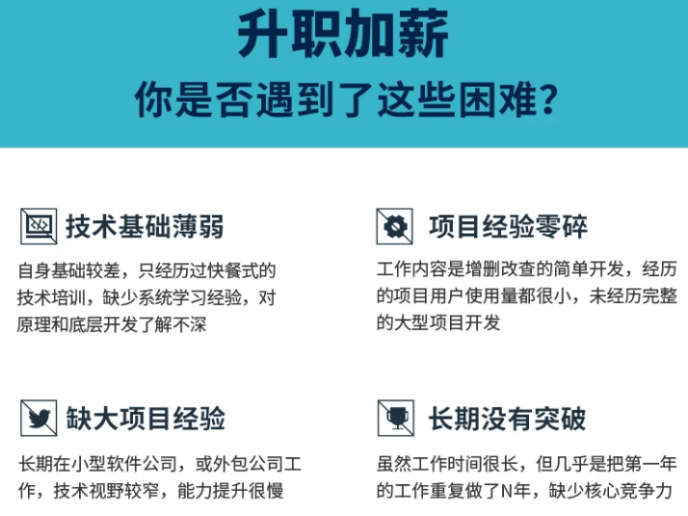

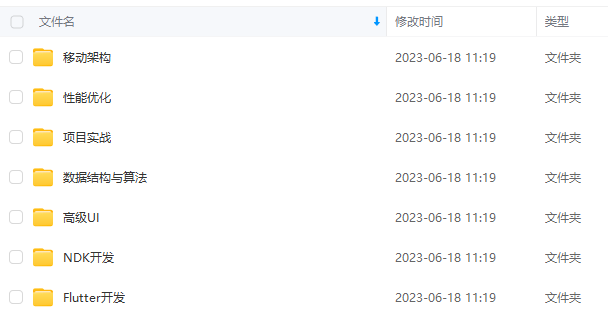
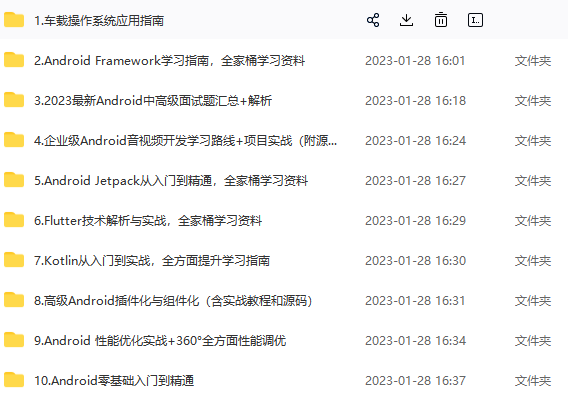
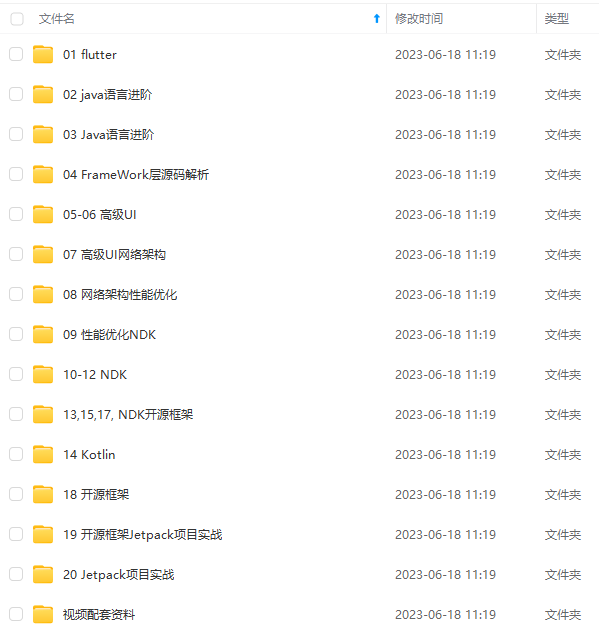
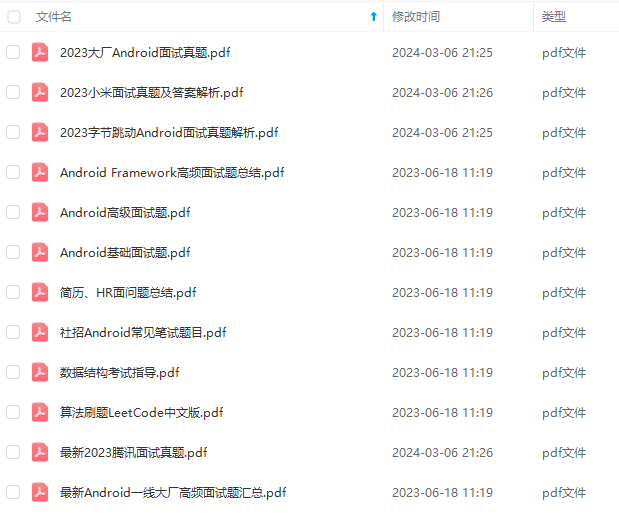
既有适合小白学习的零基础资料,也有适合3年以上经验的小伙伴深入学习提升的进阶课程,基本涵盖了95%以上Android开发知识点,真正体系化!
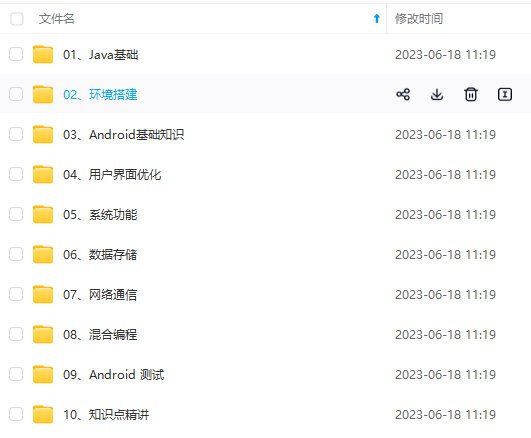
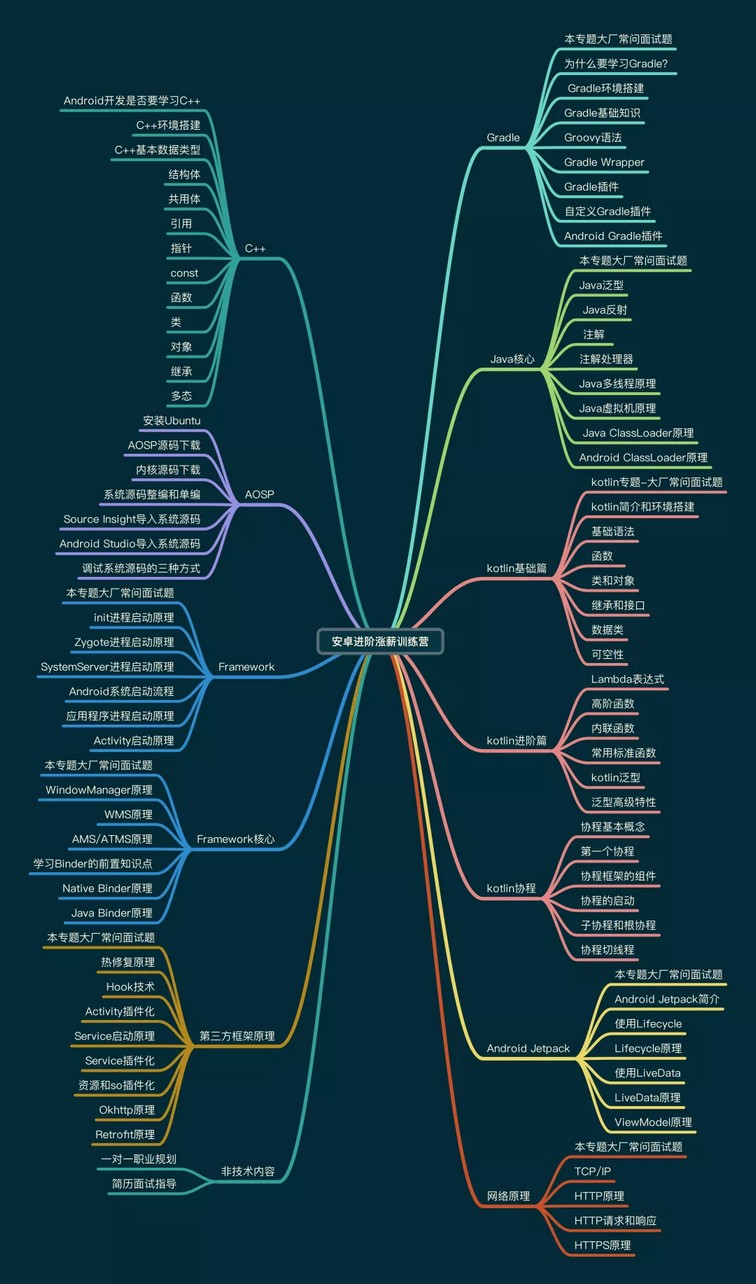
由于文件比较大,这里只是将部分目录大纲截图出来,每个节点里面都包含大厂面经、学习笔记、源码讲义、实战项目、讲解视频,并且后续会持续更新
如果你觉得这些内容对你有帮助,可以添加V:vip204888 备注Android获取(资料价值较高,非无偿)

总结
最后为了帮助大家深刻理解Android相关知识点的原理以及面试相关知识,这里放上相关的我搜集整理的14套腾讯、字节跳动、阿里、百度等2021面试真题解析,我把技术点整理成了视频和PDF(实际上比预期多花了不少精力),包知识脉络 + 诸多细节。




网上学习 Android的资料一大堆,但如果学到的知识不成体系,遇到问题时只是浅尝辄止,不再深入研究,那么很难做到真正的技术提升。希望这份系统化的技术体系对大家有一个方向参考。

]
总结
最后为了帮助大家深刻理解Android相关知识点的原理以及面试相关知识,这里放上相关的我搜集整理的14套腾讯、字节跳动、阿里、百度等2021面试真题解析,我把技术点整理成了视频和PDF(实际上比预期多花了不少精力),包知识脉络 + 诸多细节。
[外链图片转存中…(img-D0AX1FYP-1711536238595)]
[外链图片转存中…(img-w0g08jcz-1711536238595)]
[外链图片转存中…(img-6iLcS8Oe-1711536238595)]
[外链图片转存中…(img-K2enqYSG-1711536238596)]
网上学习 Android的资料一大堆,但如果学到的知识不成体系,遇到问题时只是浅尝辄止,不再深入研究,那么很难做到真正的技术提升。希望这份系统化的技术体系对大家有一个方向参考。
[外链图片转存中…(img-ceFA59eN-1711536238596)]






















 1017
1017











 被折叠的 条评论
为什么被折叠?
被折叠的 条评论
为什么被折叠?








